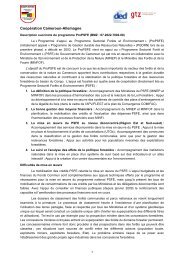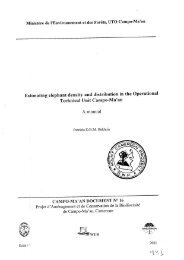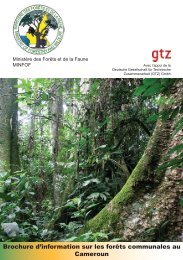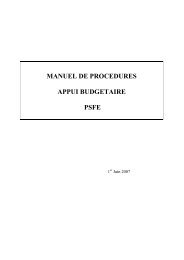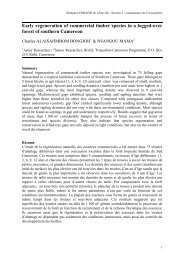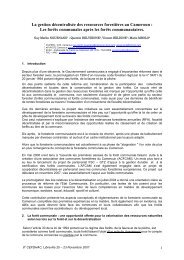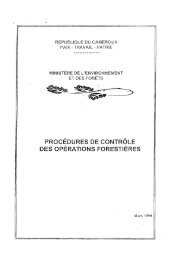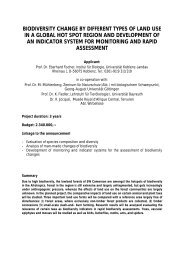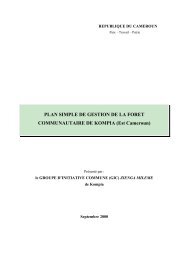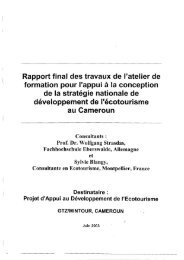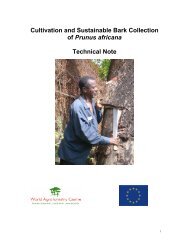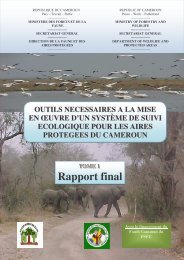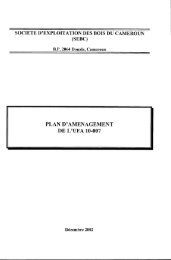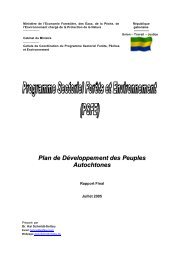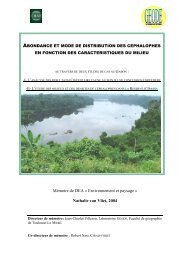nguti council monographic study - Impact monitoring of Forest ...
nguti council monographic study - Impact monitoring of Forest ...
nguti council monographic study - Impact monitoring of Forest ...
- No tags were found...
You also want an ePaper? Increase the reach of your titles
YUMPU automatically turns print PDFs into web optimized ePapers that Google loves.
Monographic Study Nguti Council1.4 MethodologyThe Elaboration <strong>of</strong> the Monographic Study for Nguti Municipality incorporated severalparticipatory planning approaches. Women and Youth group leaders were trained onparticipatory strategies while Councillors, Council Staff and related development actors weretrained and coached to collect primary and secondary data. The data was analysed andtriangulated with the assistance <strong>of</strong> the competent authorities <strong>of</strong> Government Technical Servicesand other development actors during a validation workshop organised to this effect. A draftreport was compiled and discussed with the PSMNR-SWR and necessary corrections made. Afinal report was produced and this document served the basis for drawing up a strategicdevelopment plan for Nguti Municipality.Data was collected from primary and secondary sources. Primary data was collected throughthe use <strong>of</strong> some participatory tools. Production and dissemination <strong>of</strong> 1000 copies <strong>of</strong> an 8 page questionnaire to all 54 villages Resource /social maps <strong>of</strong> the area were used to identify the resources and social structures Transect walks were used to identify the geographical features in the area. Access and control pr<strong>of</strong>ile, seasonal calendar and twenty-four hours daily activity pr<strong>of</strong>ilefor gender analysis. Semi structured interviews Focus group discussions Historical time line.Traditional Authorities and their associates were contacted for information on the history andtraditional set up <strong>of</strong> the people.Sub-Divisional Delegates <strong>of</strong> Government Technical Services were consulted to ascertain thenature and levels <strong>of</strong> activities in their areas <strong>of</strong> competence. Farmer cooperatives, credit unions,confessional institutions and other self help initiatives were contacted for information on theiractivities. The World Conservation Society and Nature Cameroon also made available pertinentinformationThe Divisional Office was contacted to gather information on related developmental andpolitical activities in the area. At the regional level information was secured and triangulatedfrom the <strong>of</strong>fices <strong>of</strong> the Governor, RDARD, MINEPAT, Education (Basic & Secondary),CEFAM and Public Health.Secondary data was obtained through the exploitation <strong>of</strong> existing documents on the socioeconomicsituation <strong>of</strong> the area including: Annual reports <strong>of</strong> the Sub-Divisional Delegation <strong>of</strong> Agriculture and Rural Development Annual reports <strong>of</strong> the Inspectorate <strong>of</strong> Basic Education Annual reports <strong>of</strong> Nguti Health District. Annual reports <strong>of</strong> Confessional Institutions in the area. Village <strong>study</strong> reports carried out in this area. Annual reports <strong>of</strong> the Nguti Council. Written and Oral history <strong>of</strong> the villages. Meteorological reports on rainfall and temperatures in this area. Population census <strong>of</strong> the Council area.3



